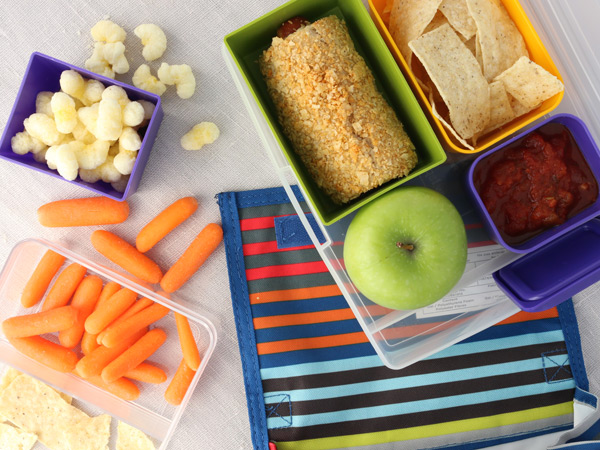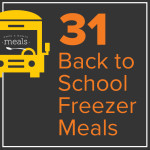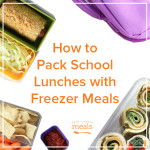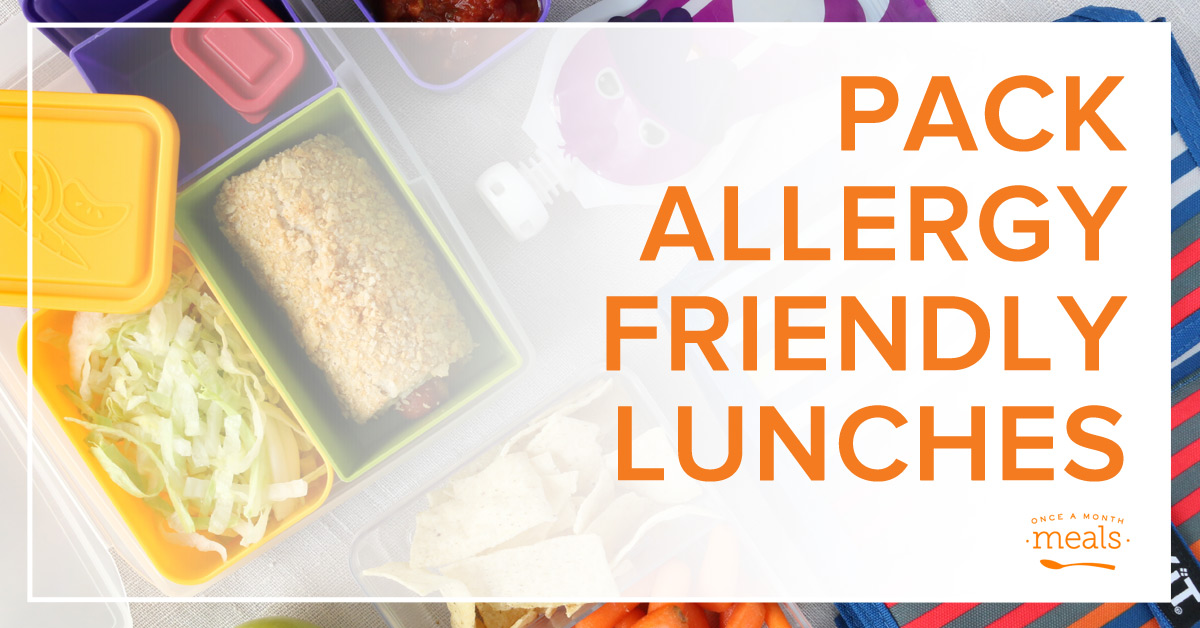
Packing a school lunch can be a battle for any parent. But packing allergy-friendly school lunches can be overwhelming for even the most organized parent. Even if you manage to put together a healthy, allergy-free, kid-approved meal, you still worry about educating your child and those around them about allergies, dealing with class parties, and interacting with school staff and parents. We want to try to take some of the anxiety out of the first step: packing allergy-friendly school lunches. But we also want to provide some practical tips for navigating the school cafeteria and beyond.
Freezer cooking can take the stress out of packing allergy-friendly school lunches.
Whether you are a veteran in allergy safety or you have just been dealt a diagnosis, you know that advance preparation is key to eating with allergies. Stocking your freezer with allergy-friendly meals and snacks once a month can take the panic out of the day-to-day preparation of food in the absence of options such as eating out, cafeteria lunches, or convenience foods.
At Once A Month Meals we are committed to providing recipes and resources that are allergy-friendly. Specifically, our membership that allows you to create completely custom meal plans for your allergies. But what else can you do to ease the stress of packing allergy-friendly school lunches?
Make a list of foods your child CAN eat
Keep it positive! Instead of focusing on what your child can’t eat, create a go-to list of recipes that are both delicious and allergen-free. Use this list to stock your pantry, stock your freezer, meal plan, and pack lunch boxes. Search our recipe archive and create a custom meal plan using your membership. Here are a few additional resources from us and from other bloggers.
- 25 Kid Friendly Gluten Free Recipes
- Gluten Free Toddler Freezer Recipes Vol. 1
- Fall Paleo Kids Mini Freezer Meal Plan Vol. 1
- Winter Nut Free Monthly Freezer Meal Plan Vol. 1
- Spring GAPS Monthly Freezer Meal Plan Vol. 1
- Lunch and Snack Ideas from Adventures of a Gluten Free Mom (The extra resources here are valuable if this is new territory for you.)
- Nut-Free Lunch Ideas from 100 Days of Real Food
Oliva says: I send a stock of things to school (with permission) in case a snack comes my son can’t have. I even cut up almond cheese and wrapped it individually as cheese sticks and the school gladly keeps it in their fridge. More practically, his teacher has a little stash of Larabars on hand just for Levi.
Educate your child and your school community
Unfortunately, not every school community is as educated as they could or should be of the dangers of food allergies. You may even be looking to educate yourself if you have recently received a diagnosis. Here are two resources you need to access right off the bat:
They will provide you with a wealth of information including your rights in the public school system and creating a 504 plan, letters for educators and other parents, tips, resources, and much more. Don’t be afraid to advocate for the safety of your child, even though you are sure to run into uncomfortable situations at times.
One of your best tools is to reach out to others in your community who deal with the same issues. You will need a friend to call when it is hard. Your child will also need to know they are not alone in this. Meet together, talk, share recipes, freezer cook together, and back each other up at school. If you are having trouble finding friends locally, reach out here! Comment on this post, ask questions on our social media accounts, or chat with one of our customer service representatives by clicking on the orange “Help” button in the bottom right-hand corner of this page.
Educating your child will be an ongoing process depending on their age. For celiacs, Beyond Celiac has a great page dedicated to children. For children with allergies, teach them about signs and symptoms, make sure they know how to use their epi-pen if they have one, and how to seek help in an emergency. Kids with Food Allergies has a great post on Talking to Children About their Food Allergies as well as numerous resources for parents, kids, and others.
Here are just a few first-hand testimonies from our staff:
Katie says: Don’t be afraid to communicate to other parents. I wasn’t told of an allergy in my son’s class and was in charge of bringing cookies for the Christmas party. When I showed up with oatmeal peanut butter cookies, I felt AWFUL that this student couldn’t have any.
Erin says: Having the kids openly talk about restrictions goes a long way because they can ask questions and make decisions if they need to.
You should definitely alert teachers, staff (nurses, cafeteria staff, etc.), and other parents in person or with a letter at the beginning of the year. But a friendly email or text reminder can help with special events (parties, field trips, etc.). Put these events on your family calendar so that you can take some time out to plan ahead. Prep your child for these events too, especially ask them how they are doing emotionally. Find out from them if there is anything you can do to help them feel included in the fun.
Personalized allergy alert labels are a great last line of defense that can be put on personal items like lunch boxes or even right on a child’s clothing. Mabel’s Labels and Etsy have several options.
Tricia says: For class celebrations, we supply foods like prepackaged gluten free cookies, brownies, etc. that my son can have on those days so he doesn’t feel completely left out and the other parents don’t have to worry as much. I also keep a supply of nonperishable items in an “emergency kit” in the car. This will include dye free hard candies, applesauce, prepackaged cookies, etc. That way when we are at a party and he can’t have anything, I can sneak out and bring him a treat.
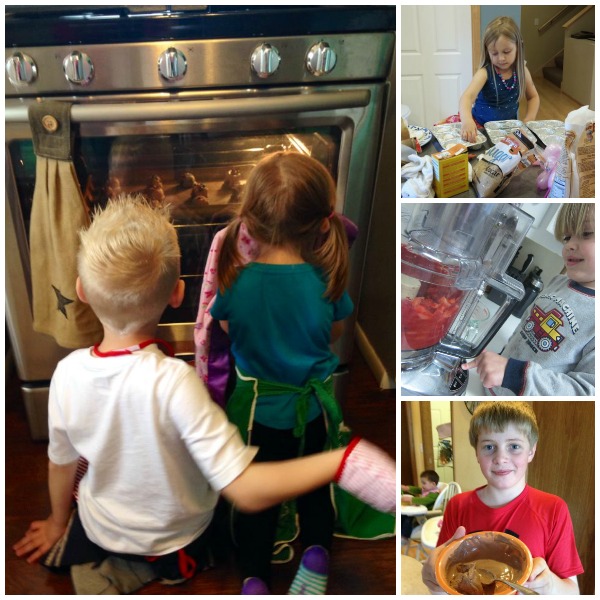
Let your child be involved in the planning process
You can empower a child with allergies or food sensitivities by giving them a measure of control in choosing, planning, and even cooking food for themselves. Help them identify all of the choices and options they DO have instead of feeling like life is controlled by their restrictions.
For instance, you may offer your preschooler a choice between two of the recipes that are on your go-to list when offering a snack or packing their lunch box. Grade school children might enjoy having one night out of the week where they get to plan the meal or they get to be mom or dad’s special kitchen helper. Older children can learn how to prepare snacks, cook simple meals, and pack their own lunches. You may even have them help you create or update your go-to list of meals for the family.
Definitely, invite your child to help when you create your freezer cooking meal plan and invite them to help you prep and/or cook as is age-appropriate. (Check out our post on Kids in the Freezer Cooking Kitchen for more tips!) Cooking is a practical tool your child will use all of his or her life!
Tricia says: Isaac is very good at self monitoring. He is responsible to help create snack bags of things that he can have as an alternative when a snack is offered that he can’t have. Isaac helps me pack the bags and he also tells me when he is out at school.
Additional Resources and Encouragement
- My Celiac Journey
- Celiac/Gluten Sensitivity and Your Child – A monster you can tame!
- How do I eat? What do I eat? Tips for eating out with Celiac Disease
- There is sick, and then there is celiac sick
